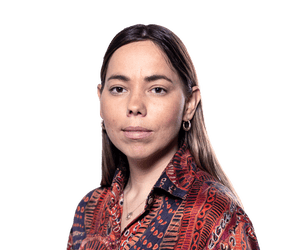Russia to pursue legal action over expulsion from site of Canberra embassy

Christopher Knaus
The Russian embassy has confirmed it will push ahead with legal action over a decision to expel it from the site of its new Canberra embassy.
Last month, the National Capital Authority publicly announced a decision to terminate the Russian government’s lease over a block of land in Yarralumla, a wealthy lakeside suburb where it was building its new embassy. The Russian government was ordered to clear the site within 20 days.
In response, the Russian embassy signalled it was considering legal action against the NCA, describing its decision as “unprecedented and highly unwelcome”. The threat of legal action forced the NCA to delay enforcing its decision.
On Wednesday, the Russian embassy confirmed it was proceeding with legal action, though did not provide further detail. A spokesperson told the Guardian:
We can confirm that the embassy is taking legal action. We would like to refrain from further comments for the time being.
The Russian government bought the site in 2008 and had plans approved in 2011, but the NCA, which oversees planning and development in Canberra’s parliamentary zone, said construction had failed to progress the works. This detracted “from the overall aesthetic, importance and dignity of the area reserved for diplomatic missions and foreign representation in the national capital”, the NCA said.
The NCA said diplomatic blocks were limited in supply, forcing it to take a “use it or lose it” approach to their development.
News Corp reported that there were concerns about the potential for Russia’s new embassy to enhance its intelligence capabilities.
The Russian embassy told the Guardian that the Australian government had sought to frustrate its efforts to protect its embassy from espionage. The spokesperson said:
In today’s world embassies are built to certain standards of security, including protection against espionage by the receiving country. Without going into details and to put it mildly, the Australian side was not eager at all to ensure that in respect of the new building of the Russian embassy in Canberra.
Key events

Sarah Collard
First Nations safety advocates are urging the federal government to address the high rates of violence facing Indigenous women and girls.
150 delegates and women’s safety advocates and experts attended a closed online summit on Monday from around the country calling for targeted measures and policies to combat violence against Indigenous women and girls and family violence prevention.
The Australian Human Right’s Commission Aboriginal and Torres Strait Islander Social Justice Commissioner June Oscar joined senior leading voices from urban, regional and remote Australia calling for urgent action.
Aboriginal and Torres Strait Islander women are 11 times more likely to die because of an assault and are 32 times more likely to be hospitalised due to family violence than other women.
The Albanese government has committed to a standalone national action plan aimed at eliminating and preventing violence against Indigenous women and children as well as the ten year national plan expected to be released by the end of the year.
Dr Hannah McGlade was one of the delegates and signatories urging the government to work with First Nations women to address the ‘appalling’ rates of violence against women and girls.
McGlade, a Noongar woman and expert member of the UN Permanent Forum for Indigenous Issues, said a standalone plan is vital to ensure violence prevention services and policies are culturally appropriate and that urgent action is needed to prevent the shortfall.
Former CEO of Mudgin-Gal a women’s support service in Redfern and women’s safety advocate Ashlee Donahue attended the summit and said it’s vital the new government hears and listens to Indigenous women when designing policy changes.
Productivity Commission reports disappointing progress on education standards across Australia
States and territories will need to improve student wellbeing, equity and the quality of teaching to boost educational outcomes and reflect high levels of funding, according to a new report from the Productivity Commission.
The commission has released its interim report on the national school reform agreement signed by federal, state and territory governments in 2018 following a $319bn funding deal over 11 years, AAP reports.
The agreement proposed eight national policy initiatives to lift education standards across Australia. But the report found progress on some of the initiatives that would make the most difference has been disappointing.
Despite governments agreeing to address needs of Indigenous students, those with a disability and from regional, rural and remote areas, there have yet to be any results to demonstrate equity improvements.
Every year between 5-9% of Australian students do not meet year-level expectations in either literacy or numeracy.
The commissioner, Natalie Siegel-Brown, said while the national agreement was a promising start, more action was needed to deliver on the initiatives.

Benita Kolovos
The transcript of Victoria’s parliamentary condolence motions for Queen Elizabeth has been amended after the state’s opposition leader, Matthew Guy, erroneously referred to King Arthur as an example of the British monarchy’s proud history.
Guy’s office on Wednesday said he had misspoken during a special sitting of parliament on Tuesday for MPs to swear allegiance to King Charles III and pay tribute to the Queen after her death last week.
Shorten says the key issue is a lack of accommodation:
I can’t say if we will get everyone who’s medically fit for discharge out by Christmas or by the middle of next year. I can promise Australians … that I am going to try to do as well as we can.
The reasons why people can’t move from hospital [is that] in some states or jurisdictions or towns, there isn’t appropriate accommodation [and] to build appropriate accommodation takes a long time sometimes.
But there is other people who I think their discharge could be sped up, by training the National Disability Insurance Agency staff who deal with the potential dischargee [and] by providing greater delegated decision-making.
I am aware of examples where the house has approved, the care team has approved but there is an argument over the cost of the cushion on the wheelchair. We have got to trust the people at the coalface, working at the hospital, [the] skilled planners at the National Disability Insurance Scheme and give them the power to make decisions on the spot.
Shorten: Around 1,500 people in hospital who are disabled are medically fit to be discharged into appropriate long-term accomodation
Every night about 1,500 people who are disabled are being forced to spend the evening in hospital despite being medically fit to be discharged. The NDIS minister, Bill Shorten, has been speaking on the ABC about it:
About 1,500 people, who are profoundly and severely impaired, go to sleep in a hospital bed but they are actually medically fit to be discharged into appropriate long-term accommodation, which is much better for the welfare of the person with a disability and also, it frees up hospital beds for other people who need immediate medical treatment.
He says part of the issue is about needing more hospital staff to help manage the backlog of patients.
… there are people with disabilities eligible for NDIS, National Disability Insurance Scheme support, to live in their own home or appropriate accommodation. What we have to do is bring in wranglers, to use a colloquial term.
There are good clinicians in the hospitals, allied health professionals, social workers, and disability insurance agency staff, get them working together in a more speedy fashion to put together packages of care. What’s involved is you might have to have your home modified, ramps put in, your bathroom varied, modified, or you might need to find appropriate accommodation.
You have got to find a house which may have one or two other people with disabilities, but they are people that you could share a house with and then you have to sometimes get seven day a week, 24-hour rosters of carers. This all takes time but the system is taking far too long now and it has been put in the too-hard basket for too many years by too many people at the top.
Russia to pursue legal action over expulsion from site of Canberra embassy

Christopher Knaus
The Russian embassy has confirmed it will push ahead with legal action over a decision to expel it from the site of its new Canberra embassy.
Last month, the National Capital Authority publicly announced a decision to terminate the Russian government’s lease over a block of land in Yarralumla, a wealthy lakeside suburb where it was building its new embassy. The Russian government was ordered to clear the site within 20 days.
In response, the Russian embassy signalled it was considering legal action against the NCA, describing its decision as “unprecedented and highly unwelcome”. The threat of legal action forced the NCA to delay enforcing its decision.
On Wednesday, the Russian embassy confirmed it was proceeding with legal action, though did not provide further detail. A spokesperson told the Guardian:
We can confirm that the embassy is taking legal action. We would like to refrain from further comments for the time being.
The Russian government bought the site in 2008 and had plans approved in 2011, but the NCA, which oversees planning and development in Canberra’s parliamentary zone, said construction had failed to progress the works. This detracted “from the overall aesthetic, importance and dignity of the area reserved for diplomatic missions and foreign representation in the national capital”, the NCA said.
The NCA said diplomatic blocks were limited in supply, forcing it to take a “use it or lose it” approach to their development.
News Corp reported that there were concerns about the potential for Russia’s new embassy to enhance its intelligence capabilities.
The Russian embassy told the Guardian that the Australian government had sought to frustrate its efforts to protect its embassy from espionage. The spokesperson said:
In today’s world embassies are built to certain standards of security, including protection against espionage by the receiving country. Without going into details and to put it mildly, the Australian side was not eager at all to ensure that in respect of the new building of the Russian embassy in Canberra.
Missing hiker found after five days

Joe Hinchliffe
A 36-year-old Colombian woman missing in the remote rainforests of north Queensland for five days has been found.
Juliana Castrillon was last seen setting off alone on a 14km, eight-hour hike after leaving a remote and unofficial rainforest party south of Cooktown on Saturday morning.
She had spent several days in Cedar Bay with a gathering of dozens of backpackers, locals and others who had attended the spiritual electronic music festival Orin Aya the previous weekend.
Family and friends held grave fears for Castrillon when she didn’t arrive at her destination that evening, saying she was reliable, responsible and determined to return to Bryon Bay by Monday to open her shop Byron Bay Traders on Monday.
After two days of aerial searching failed to locate Castrillon, police and SES began a ground search on Wednesday, saying crocodiles, venomous snakes, deep ravines, treacherous waterways were all “concerns in relations to survivalbility”.
But those fears were put to bed on Wednesday afternoon when SES volunteers found Castrillon alive.
She will now undergo medical assessments.
Indigenous group to hold protest in Brisbane on national day of mourning for Queen Elizabeth
A protest for Indigenous people will be held on the National Day of Mourning for Queen Elizabeth II, AAP is reporting.
Warriors of the Aboriginal Resistance, which has more than 60,000 Facebook followers, will take to Brisbane streets on 22 September to decry past atrocities and the impact of British colonisation in Australia.
“This is a stance against the continued crimes committed against marginalised First Nations, black, brown and Asian communities. We do not support benefactors or Stolenwealth (sic) and demand justice, truth and accountability for all. Justice for all,” the group wrote.
Queen Elizabeth died aged 96 at Balmoral Castle in Scotland on September 8.
While supporters have hailed her 70-year reign, some Indigenous leaders say the British monarchy represents a violent history.
Macquarie University academic and Wiradjuri woman Sandy O’Sullivan said they were subjected to racism for refusing to celebrate the Queen’s reign.
“Along with many other Aboriginal people, I experienced a lot of racism and derision around raising the fact that we weren’t celebrating the reign of the previous monarch, Queen Elizabeth II,” they said.
“For many it’s because during that reign there was little that she did to reset that relationship, to make reparations and to speak out.”
Ryan: Australia has the highest mortality per capita from Covid at the moment
Ryan was also asked what areas she thought had fallen away in our response to Covid in the last few months. This is what she said:
We have removed the mitigation strategies, stress, test, trace, isolate and quarantine. We have removed mask mandates, isolation guidelines and quarantine guidelines. We are shutting up shop and packing up the chairs and heading home, pretending that Covid is no longer here.
The reality is that we have the highest mortality per capita from Covid in Australia of any country in the world at the moment.
More than 3,000 Australians have died of Covid in aged care this year. That is more than the previous two years combined.
Even though we would love it to go away … it hasn’t gone and it is not going away. We need to be cognisant of that and we need to be responsive to it and give people a sense of how we are going to deal with this over the [next] 6-12 months.
Ryan says she wants a national summit on Covid:
What the government needs to do – and I hope that a summit would achieve this – is to rejig things.
Get everyone into the same room – the economists, the people from industry, the health care workers, people from secondary and tertiary education, child care, disability care, aged care – and say we can’t get rid of this, [Covid] is with us. We have to deal with it and we will do it together.
How are we going to do that? This is what happens if we get something moderately nasty coming towards us and this is the plan if it all goes to hell over summer.
Everyone understands what the future looks like then and on what basis those decisions are being made.
Monique Ryan concerned government will remove Covid isolation requirements
Independent “teal” MP Monique Ryan is on the ABC right now talking about the government’s earlier announcement pandemic leave payments will be extended. Ryan said she supports the extension but said she is concerned the government is about to remove all isolation requirements.
I think I and many other people who are concerned about this space would really like some greater clarity about for how long the government is going to continue isolation requirements.
We know that they decreased the mandatory isolation requirement from seven days to five days recently without telling us on what basis that decision was made. We have reason for concern that they might remove isolation requirements altogether in the near future.
Ok, today’s First Dog is very good, and I have it here for you below. Spoiler – a certain fountain pen gets a mention:
Victoria Chamber of Commerce recommends land tax replace stamp duty
From AAP: Victoria’s major parties are being urged to follow NSW and swap stamp duty for a land tax system.
The Victorian Chamber of Commerce and Industry released its 2022 state election policy platform on Wednesday, 73 days before voters head to the polls.
Its 61 recommendations include that Victoria replaces stamp duty with a broad-based land tax system, ahead of a planned tweak in NSW from next year. From January, first home buyers in NSW will be able to choose between paying stamp duty once or opting into an annual tax on properties up to $1.5m.
The properties would not be locked into the tax if sold.
It was a good first step and Victoria should watch the NSW system and move to adopt a similar model, VCCI’s chief executive, Paul Guerra said.

Joe Hinchliffe
Authorities are preparing to ramp up the search for a woman missing in far north Queensland since the weekend when she tried to complete an eight-hour hike on a rough rainforest track.
Friends of Colombian national Juliana Castrillon hold grave concerns for the 36-year-old who was reportedly walking alone after attending a remote jungle party the previous weekend south of Cooktown.
Hello everyone, this is Cait Kelly – first up, a big thank you to Amy Remeikis for taking us through the morning!
Tasmanian premier says discussions for state to enter AFL ongoing
Let’s just jump down to Tasmania first up – where there is an update on the delay for the state to get its own AFL team. From AAP:
Tasmania’s premier isn’t fazed by delays around the decision on a 19th AFL licence, indicating grassroots funding remains a sticking point between the league and the state government.
A vote by the 18 club presidents on whether to grant Tasmania entry to the competition was originally slated to occur by the end of August.
The premier, Jeremy Rockliff, said discussions with the AFL were ongoing in relation to several matters, but said a decision was expected in the “not-too-distant future”.
“We’ve been waiting 30 years for this. It’s important we do due diligence [and] ensure we get value for money,” he said on Wednesday.
Rockliff wouldn’t be drawn on whether the state government was open to increasing their $150m funding offer, made up of $10m a year over 10 years and $50m for start-up costs.
He said talks were continuing with the AFL to ensure grassroots footy in Tasmania received adequate support.
